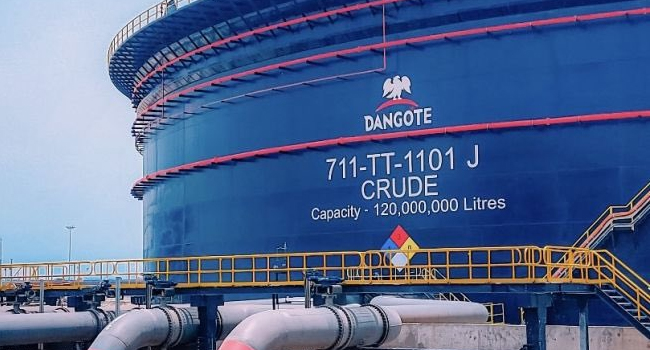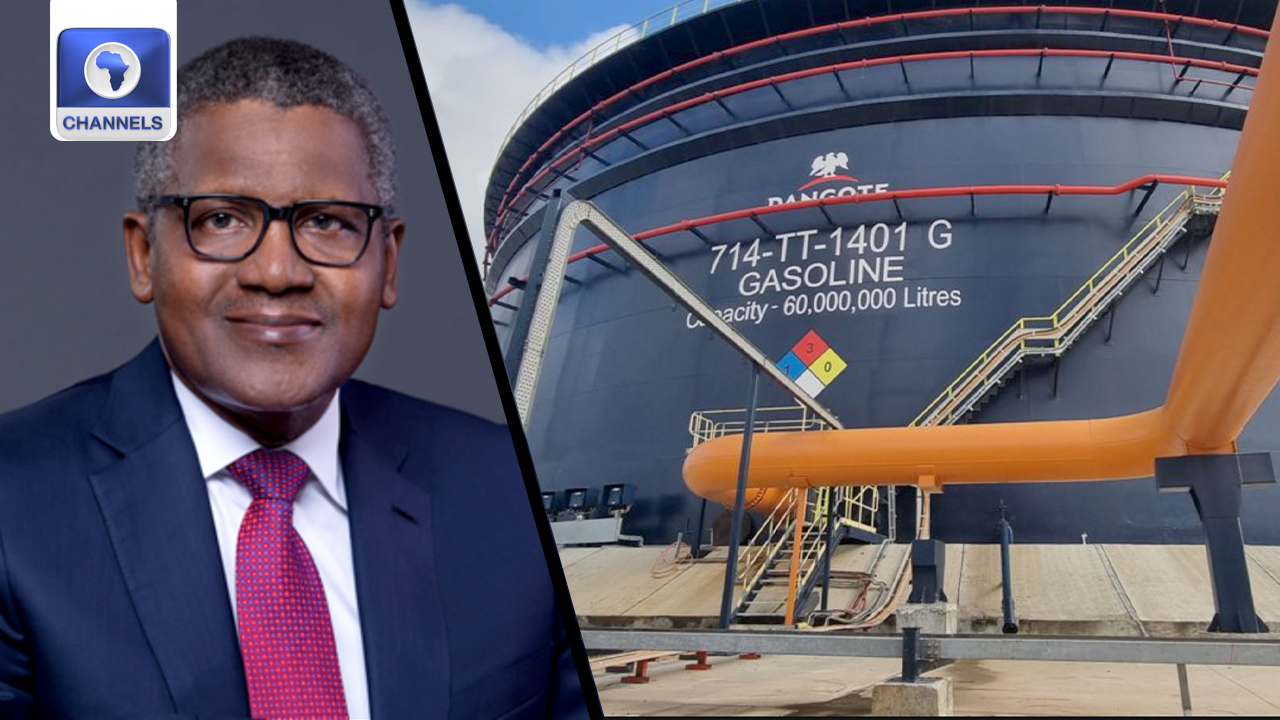Experts believe that prices of petrol and diesel may not crash significantly despite the commencement of production at the Dangote Petroleum Refinery.
With the removal of subsidy on petrol in May 2023, the price per litre of petrol jumped from around N184 to over N600 depending on the location. Diesel also sells for about N1500 per litre at retail outlets.
Petrol marketers are optimistic that production at Dangote refinery will significantly force down the prices of petrol and diesel.
But the experts said though the behemoth refinery is located in Lagos, Nigeria, the input cost for the operationalisation of the $20bn facility is import-dependent, adding that the volatility of the foreign exchange rates might make it difficult for any marginal reduction in the prices of the premium commodities.
These were the thoughts of the Publisher of Sweet Crude Reports, Hector Igbikiowubo; and Nairametrics Founder, Ugodre Obi-Chukwu; on Inside Sources with Laolu Akande, a socio-political programme aired on Channels Television on Friday.
Both Igbikiowubo and Obi-Chukwu commended Africa’s richest man, Aliko Dangote, for defying all odds to ensure that his dream to build a functional refinery came to life.
They said Dangote demonstrated that the Federal Government has no excuse not to get the country’s four dormant refineries working and urged the Nigerian National Petroleum Company (NNPC) Limited to increase crude supply to the private refinery.
The billionaire business tycoon recently said his refinery would continue to import 24 million barrels of West Texas Intermediate crude due to insufficient local crude production and supply by the state-run NNPC.
The experts said though the private refinery won’t solve Nigeria’s energy security needs, its operations would go a long way in making premium petrol products available in the country.
“The Dangote Refinery cannot solve the problem because the Dangote Refinery will continue to pay for crude oil in USD (United States Dollar),” Igbikiowubo said.
“The question now is how come the NNPC isn’t allotting all of its 445,000 barrels per day to the Dangote Refinery for refining? Why is it convenient to export crude oil when you have a facility like the Dangote Refinery up and running? You make more money if you export refined petroleum products than if you export crude oil.”
Obi-Chukwu agreed with Igbikiowubo that the dominance of the greenback in the operational cost of the Dangote Refinery might not necessarily lower the cost of the refined products for end users.
Obi-Chukwu said, “As much as the refinery is local, most of the input cost for that refinery is still going to be imported. Whether it is the personnel that will service the refinery. Whether it is the spare parts that will be changed and serviced. Even the crude itself is also being imported.
“A lot of the breakdown of the cost still has foreign components in there. So, it is quite unlikely that you might see a substantial amount of savings to the end consumers. Nevertheless, even if we get 10% savings, it is still better than what we currently have.”
The refinery sited in Lagos and owned by the billionaire businessman commenced operations last December with 350,000 barrels a day. The refinery hopes to achieve its full capacity of 650,000 barrels per day by the end of the year.
The refinery has begun the supply of diesel and aviation fuel to marketers in the country while petrol supply is expected to commence mid-July.
READ ALSO: Dangote To Expand Refinery Storage Capacity By 600 Million Litres
Energy Security
The experts said though the Dangote Refinery has been operational, the country’s four refineries sited in three locations across the country should be made to function to guarantee energy security for the country.
The four state-owned refineries which are in dilapidated condition are sited up north in Kaduna with three units sited in the southern region – Port Harcourt and Warri. Attempts to get them working for about two decades have not been successful despite billions of naira spent on turnaround maintenance.
The newspaper publishers believe the Bola Tinubu administration should do all in its ability to make the state-owned refineries work.
Igbikiowubo said, “The essence of having the NNPC refineries working is to guarantee energy security for the Nigerian state.”
He said though the NNPC has about 20% stake in the Dangote Refinery, the refinery does not belong to the Nigerian state.
“We should have a coherent energy security in place,” he said. “If you have refineries, those refineries should work.”
Igbikiowubo said privatisation of the state-owned refineries does not guarantee energy security as the private company is interested in profit-making for its shareholders and not necessarily ensuring that the populace gets the premium commodities easily and at cheap rates.
“Where is NITEL today? It was privatised. Where is Daily Times today? It was privatised. We need to be accountable. The money sunk into the refineries, what happened to them?”Igbikiowubo asked.
“Last year, the petroleum minister granted an interview that the Port Harcourt Refinery would be up by December. This is June and nothing has happened. He is not being held to account.”
He said subsidy removal should be predicated on local refining and not import-dependent products controlled by the vagaries of foreign exchange.
“You have a group of persons who are benefitting with the status quo and they will do everything to ensure the status quo remains,” said the Sweet Crude Reports publisher.
‘Privatise With Clear Mandate’
The publisher of Nairametrics posited that privatisation can work – and it has worked before in other sectors of the country – if done the right way.
“We’ve practiced one model before, the government trying to run the refineries. It hasn’t worked. What we see now is funds being misappropriated from the very limited funding space that we have as a country and these funds are being squandered. So, there is no point. The same thing with the Ajaokuta Steel.
“You have to privatise properly with a clear mandate and key performance indicators including public list on the Nigerian Stock Exchange (NSE),” he said.
He urged the government to set the right policies to allow private businesses to flourish in the country.



